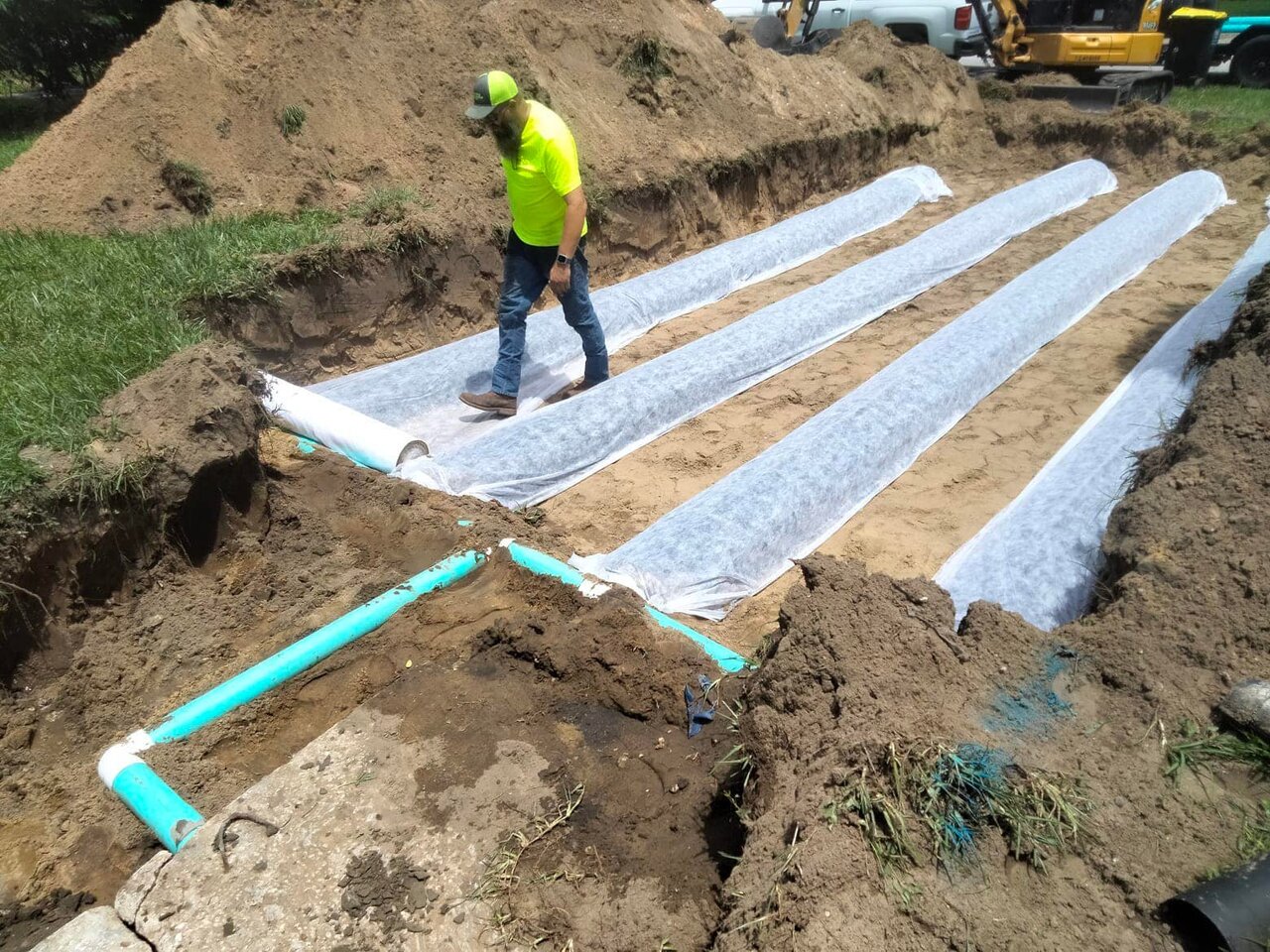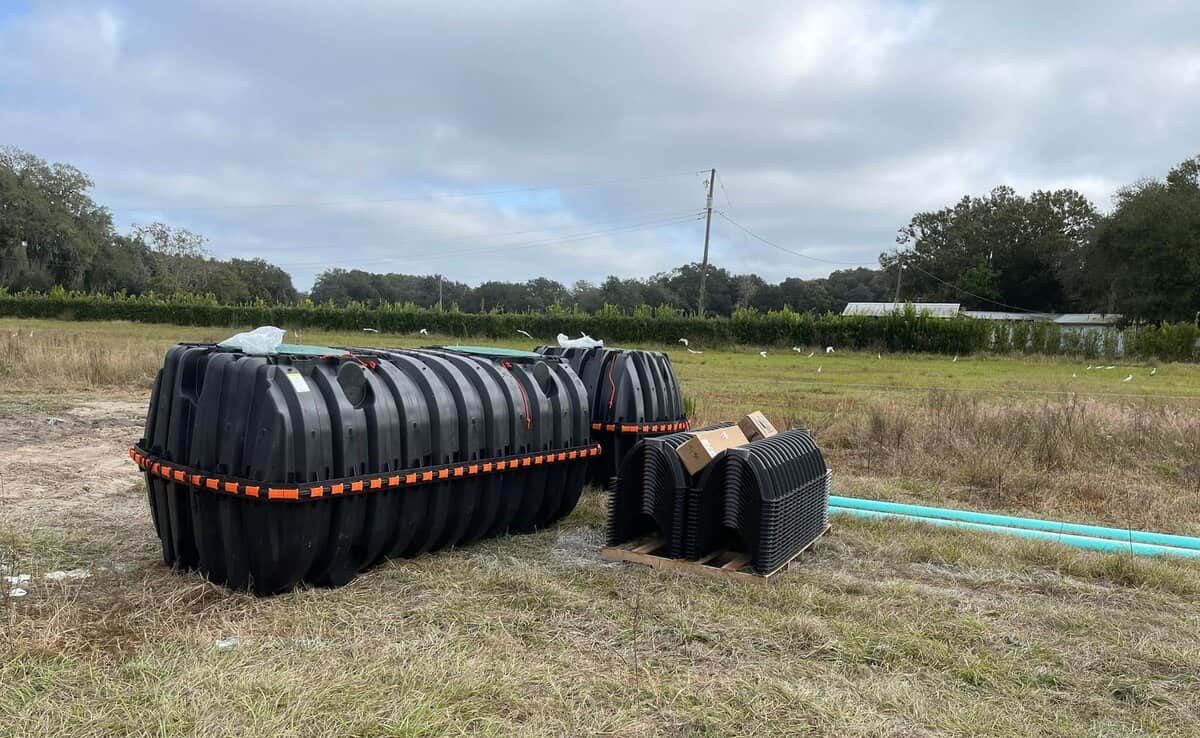Your home’s septic system is designed to process wastewater so that it can be returned to the environment uncontaminated. The system’s components all work together without issue when everything is functioning properly.
However, a septic system can quickly become a serious and potentially dangerous problem if any one of the individual elements malfunctions. One of the most frequent reasons that homeowners need septic services is issues with the septic tank.
What Is a Septic Tank?
A septic tank is a water-tight container, usually made of concrete, fiberglass, or plastic. Typically buried underground, the septic tank holds wastewater long enough to allow bacteria in the tank to digest organic matter, while solids settle to the bottom to form sludge, and fats, oils, and grease float to the top, forming scum.
The liquid from a septic tank is called effluent, and it gets discharged through a pipe into the drainfield, where the final decontamination processes occur.
A properly functioning septic tank is critical to your septic system. If the ecosystem of the tank is thrown off balance, or if clogs cause backups, serious problems can result.
Part of ensuring that your septic system continues to work as intended is to have a regular septic tank inspection and septic tank pumping every two to five years.
What Can Clog a Septic System?
Your home’s septic system is designed to effectively and efficiently process waste. All of the components work together to get wastewater from the home, through a processing cycle, and then back into the environment free of dangerous contaminants.
However, a clog or blockage in any part of the system can disrupt the flow of liquid through the system, throwing off the delicate balance. Clogs are a common problem for homeowners with septic systems because they require ongoing maintenance and, most importantly, day to day care in terms of what gets put into the system.

Here are some things that can cause clogs:
- Any non-liquid object other than human waste can get trapped at any point in the system. From the main waste pipe leading from the home into the septic tank to the pipes carrying the effluent into the drainfield and the drainfield pipes themselves, even a fairly small object can cause a serious blockage. Avoid flushing things like wipes, cigarette butts, feminine hygiene products, or cat litter into the system. You can also consider using septic safe toilet paper that is designed to break down easily.
- Septic professionals are often asked, “Are coffee grounds bad for a septic system?” The answer is yes. Coffee grounds won’t break down in the tank, and they can throw off the septic tank’s pH, leading to eventual problems.
Other Things to Avoid Putting in a Septic System
If you are wondering what will ruin a septic system beside materials that cause clogs, you might be surprised to learn that there are a few.
Chief among them is anything that disrupts the effective functioning of the bacteria in the system. Bacteria in a septic tank are a vital part of the process of returning wastewater safely into the environment. They grow naturally in the septic tank, and help turn solids in the system into liquid.
If materials are introduced that impact the functioning of the bacteria, problems can quickly escalate. Keep the bacteria in your septic tank healthy by following these tips:
- Do not overuse antibacterial soaps or detergent. These products are specifically designed to kill bacteria, which is the opposite of the goal for a septic tank.
- Bleaches and other harsh cleaners can likewise kill bacteria. In place of bleach, try using a combination of baking soda and vinegar, both of which are safe for a septic system.
- Medicines, both prescription and over the counter, can be hazardous to the balance of bacteria in your septic tank. Some might kill the bacteria, while others might cause the bacteria to grow out of control.
- Clogged or blocked pipes are a cause for concern and often require a septic professional to address properly. If you elect to attempt to clear the clog on your own, be sure to use a septic safe drain cleaner.
Water usage that is in excess of what the septic system was designed for can also cause problems. If the septic tank cannot keep up with the flow of wastewater, it can become overfull and lead to sewage backing up in the home.

To avoid overburdening the system with too much water, consider these suggestions:
- Spread laundry out through the week rather than doing it all in one day. This allows time between washings for the system to begin processing the wastewater.
- Find ways to conserve water in the home. Keep showers short, and do not run water unnecessarily. Buy low-flow shower heads and faucets, and toilets that use less water.
Septic tank additives are a popular product sold by companies who suggest that they are necessary to maintain the proper functioning of your septic system. However, additives can cause problems and are not necessary for a septic system that is in balance.
Highlighting the confusion around how septic systems work, one old myth involved putting dead animals in septic tanks. This was supposed to kickstart the system by providing nutrients to help the bacteria. Needless to say, this is not the case and would quite likely cause serious problems.
A properly maintained septic system will last for years without problems, assuming that proper care is taken, and septic tank cleaning and other services are done on a regular basis.
Septic and Drainfield Services in Central Florida
Septic and Drainfield Depot’s team of experts is here to help with all your residential and commercial septic needs. From installation to inspections, pumping, and repairs, we are committed to finding the right solution for your needs and your budget.
As a licensed and insured septic contractor in the state of Florida, we are committed to maintaining our reputation as one of Lakeland and central Florida’s top septic companies.







